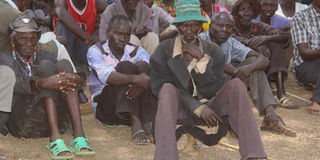Development key to stability in North Rift, West Pokot leaders say

Residents of Chesegon in Sigor constituency of West Pokot County during a peace meeting on March 25, 2016. West Pokot leaders have said implementation of development projects in counties is the key to attainment of peace and stability in the North Rift. FILE PHOTO | NATION MEDIA GROUP
What you need to know:
- Led by West Pokot Assistant County Commissioner Geoffrey Kithinji, the leaders said progress had been made in securing the area from cattle rustling and other forms of inter-community conflict.
- The administrator added that they had introduced a Reformed Warrior’s Initiative, which they hope to use in encouraging members of the community to surrender their arms and be part of the peace-making process in the affected counties.
Implementing development projects in counties is the key to attaining peace and stability in the North Rift, West Pokot leaders have said.
The leaders said creating job opportunities and promoting intercultural interactions between counties would ensure cohesion among different communities.
Led by West Pokot Assistant County Commissioner Geoffrey Kithinji, the leaders said progress had been made in securing the area from cattle rustling and other forms of inter-community conflict.
“Today, because of development, cultural practices that involved exchange of animals for dowry have incorporated modern practices that cease to encourage illegal acquisition of livestock,” Mr Kithinji said.
And even though Mr Kithinji acknowledged that the proliferation of firearms remains and that disarmament exercises would continue, he said community members must be willing to surrender their arms for peace.
He spoke during the final leg of the Kenya National Commission on Human Rights (KNCHR) public inquiry in the North Rift region.
The administrator added that they had introduced a Reformed Warrior’s Initiative, which they hope to use in encouraging members of the community to surrender their arms and be part of the peace-making process in the affected counties.
“We now have 90 reformed warriors from Turkana, Marakwet and Pokot, each region with 30 representatives who are now peace ambassadors seeking development for their people and neighbouring communities at large,” said the elated officer.
Speaking during the same function, KNCHR chairman Kagwiria Mbogori emphasised the need for communities to come up with home-grown solutions to chart their own development agenda.
“We are here as facilitators, but you are the main actors in this peace-building process,” she said.
Although the West Pokot and Turkana communities have enjoyed one year of relative peace, residents, some of whom painfully recollected the loss of loved ones and their livelihood through livestock theft, still believe a lot more needs to be done to end decades of insecurity.
The issues of boundaries and sharing of resources, especially herding grounds, remain the main triggers of animosity.
The rights commission launched a public inquiry on insecurity and its impact on the enjoyment of human rights in the North Rift in May this year.
Already, the commission has held hearings in Marigat, Bartabwa, Kabarnet, Chemolingot, Yatia, Kapedo, Lokichar, Kainuk and Orwa.
The commission spoke to residents, governors, security agents, civil society organizations and other non-governmental stakeholders who serve in the regions represented.
The final report will be publicised and shared with all arms of government, including the President and other stakeholders, to pave the way for lasting solutions to the conflict in the North Rift.





